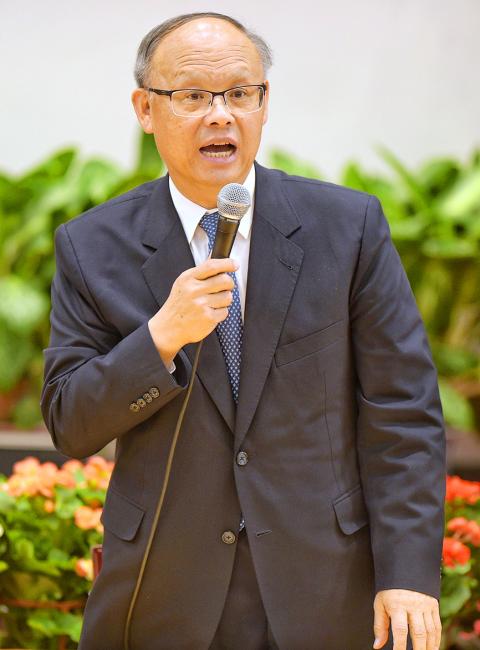The government is planning to send a high-level Ministry of Economic Affairs (MOEA) official to the US to negotiate the exemption of Taiwanese steel and aluminum exports from US tariffs, an official at Taiwan’s representative office in the US said.
The official, who spoke on condition of anonymity, said that the visit would take place before Friday, when the tariffs are to take effect.
Minister Without Portfolio John Deng (鄧振中), who doubles as head of the Executive Yuan’s Office of Trade Negotiations, was later yesterday quoted by the Central News Agency as saying that he would head the delegation to the US, which is to leave today.

Photo: Chang Chia-ming, Taipei Times
The White House on March 8 announced that US President Donald Trump signed an order under Section 232 of the Trade Expansion Act of 1962 to impose a 25 percent tariff on imported steel and a 10 percent tariff on imported aluminum.
However, the order makes it clear that nations that wish to obtain a waiver for these tariffs are allowed to come up with “satisfactory alternative means” to address trade imbalances.
For Canada and Mexico, the only nations that have been temporarily excluded from the tariffs, this means complying with US demands when renegotiating the North American Free Trade Agreement.
The day that the tariffs were announced, the ministry issued a statement saying that it would seek negotiations with the US on the matter.
The government is hoping that the ministry official will be able to convey the importance of Taiwan as a trade partner and a security ally to the US, the official said.
According to ministry data, Taiwan’s steel exports to the US last year totaled US$1.3 billion, accounting for 13.16 percent of Taiwan’s total steel exports, while its aluminum exports to the US totaled US$44 million, or 6.15 percent of its total aluminum exports.
Last year, the US was the largest buyer of Taiwanese steel products and the sixth-largest buyer of Taiwanese aluminum products.
Taiwan has reiterated its commitment to standing with the US to protect regional peace and stability, the official said.

INVESTIGATION: The case is the latest instance of a DPP figure being implicated in an espionage network accused of allegedly leaking information to Chinese intelligence Democratic Progressive Party (DPP) member Ho Jen-chieh (何仁傑) was detained and held incommunicado yesterday on suspicion of spying for China during his tenure as assistant to then-minister of foreign affairs Joseph Wu (吳釗燮). The Taipei District Prosecutors’ Office said Ho was implicated during its investigation into alleged spying activities by former Presidential Office consultant Wu Shang-yu (吳尚雨). Prosecutors said there is reason to believe Ho breached the National Security Act (國家安全法) by leaking classified Ministry of Foreign Affairs information to Chinese intelligence. Following interrogation, prosecutors petitioned the Taipei District Court to detain Ho, citing concerns over potential collusion or tampering of evidence. The

Seventy percent of middle and elementary schools now conduct English classes entirely in English, the Ministry of Education said, as it encourages schools nationwide to adopt this practice Minister of Education (MOE) Cheng Ying-yao (鄭英耀) is scheduled to present a report on the government’s bilingual education policy to the Legislative Yuan’s Education and Culture Committee today. The report would outline strategies aimed at expanding access to education, reducing regional disparities and improving talent cultivation. Implementation of bilingual education policies has varied across local governments, occasionally drawing public criticism. For example, some schools have required teachers of non-English subjects to pass English proficiency

NEGOTIATIONS: The US response to the countermeasures and plans Taiwan presented has been positive, including boosting procurement and investment, the president said Taiwan is included in the first group for trade negotiations with the US, President William Lai (賴清德) said yesterday, as he seeks to shield Taiwanese exporters from a 32 percent tariff. In Washington, US Trade Representative Jamieson Greer said in an interview on Fox News on Thursday that he would speak to his Taiwanese and Israeli counterparts yesterday about tariffs after holding a long discussion with the Vietnamese earlier. US President Donald Trump on Wednesday postponed punishing levies on multiple trade partners, including Taiwan, for three months after trillions of US dollars were wiped off global markets. He has maintained a 10 percent

TRADE: The premier pledged safeguards on ‘Made in Taiwan’ labeling, anti-dumping measures and stricter export controls to strengthen its position in trade talks Products labeled “made in Taiwan” must be genuinely made in Taiwan, Premier Cho Jung-tai (卓榮泰) said yesterday, vowing to enforce strict safeguards against “origin laundering” and initiate anti-dumping investigations to prevent China dumping its products in Taiwan. Cho made the remarks in a discussion session with representatives from industries in Kaohsiung. In response to the US government’s recent announcement of “reciprocal” tariffs on its trading partners, President William Lai (賴清德) and Cho last week began a series of consultations with industry leaders nationwide to gather feedback and address concerns. Taiwanese and US officials held a videoconference on Friday evening to discuss the